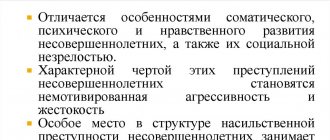The concept of “theft” includes secret encroachment on someone else’s property, from petty shoplifting to serious crimes involving entry into someone else’s home. Despite this, the legislator strictly separates the concepts of “theft” and “petty theft”. Such a division is necessary for the correct qualification of the act and the imposition of punishment for the perpetrator, including if the act was committed by a minor. The article regulating the liability of minors for theft will not be 158, but 88 of the Criminal Code of the Russian Federation.
Administrative responsibility
In accordance with Article 2.3 of the Code of Administrative Offenses, a person can be charged with committing an administrative offense if he has reached 16 years of age on the day of committing the illegal actions. At the same time, cases of offenses committed by minors are considered by the commission on juvenile affairs.
Article 7.27 of the Code of Administrative Offenses provides for alternative sanctions for petty theft, including a fine and administrative arrest, but by virtue of Article 3.9 of the Code of Administrative Offenses, administrative arrest is not imposed on violators under eighteen years of age, so in practice only a fine is imposed.
Note!
Petty theft, within the meaning of Article 7.27 of the Administrative Code, is the theft of property worth less than 2,500 rubles.
If a minor does not have his own official income, the fine is paid by his parents or guardians.
In addition, the Commission on Minors' Affairs is empowered, taking into account the actual circumstances, to release a minor from administrative liability, subject to the imposition of other educational measures provided for by the legislation on the protection of minors.
Principles of holding minors accountable for theft
In general, persons defined in paragraph 20 of the Criminal Code are punished for crimes.
When the case is considered in court, the official status of the teenager is clarified. From the age of 16, some persons can gain partial or full legal capacity as part of emancipation (for example, young people who have started their own family). They are subject to full responsibility as adults. Hint: the decision to apply to a young person of advanced age is formalized by a decision of the local government body. Within the framework of the paragraphs of the Criminal Code, criminal punishment is applied to minors according to the following principles:
- sanctions for violations of laws apply from the age of 16;
- paragraph 20 highlights the offenses for which liability begins at the age of 14;
- minors are not condemned for their acts, but taking into account the danger of the offense, they can be placed in a state educational and correctional institution.
For information: the court gives instructions to the organization implementing the decision regarding the minor to take into account the characteristics of the latter’s character.
Criminal penalty
The rules for imposing punishment on persons who have not achieved full legal capacity are prescribed in Article 88 of the Criminal Code. They are:
- Fine . This punishment can be applied to teenagers regardless of whether they have their own income. The amount varies depending on the degree of public danger of the offense from one to fifty thousand rubles . Parents or other representatives of the erring child can contribute money to the treasury at their own discretion (the court is obliged to make sure of the good will of the adult).
- Mandatory work . Such influence is applied by the court taking into account the physical development of the offender. In addition, a teenager must work in his free time from school or main work. In this regard, he cannot be involved in compulsory service for more than: two hours a day for adolescents under 15 years of age;
- three - until the age of sixteen.
Article 88. Types of punishments imposed on minors by the Criminal Code of the Russian Federation
Hint: when punishing teenagers, the terms specified in the articles of the Criminal Code are halved. In addition, the court has the right to impose a suspended sentence the first time and in case of relapse of the offense during the probationary period.
Administrative responsibility
Theft of property of small value (up to 2,500.0 rubles) is subject to administrative punishment. This is defined in Article 7.27 of the Administrative Code. The text of the law provides a gradation of damage and punishment for the act:
- up to 1,000.0 rub. a fine in the amount of five times the price of the goods, but not less than 1,000.0 rubles;
- up to 2,500.0 rub. – also fivefold, but not less than 3,000.0 rubles.
Article 7.27. Petty theft Code of Administrative Offenses
Hint: the price of the stolen item is determined depending on the situation:
- at nominal value (purchase);
- according to experts.
During the proceedings, the court takes into account the following factors in favor of the defendant:
- committing an offense for the first time;
- the severity of life circumstances;
- others by decision of the judge (the law does not limit the list).
For information: the fine for an offender who does not have his own income can be paid by loved ones.
Disciplinary action
In order to prevent crime among teenagers, juvenile offenders are registered:
- law enforcement agencies;
- a commission for minors established in the local administration;
- educational institution.
The following activities are held with teenagers:
- preventive conversations;
- involving the community in public life;
- visit to place of residence;
- others.
Hint: young people are supposed to visit the service that registered them monthly for monitoring.
Criminal liability
If the committed act is more serious than petty theft, it is regarded as a criminal offense under Article 158 of the Criminal Code - Theft.
The general age at which a person can be recognized as a criminal and incur criminal liability is 16 years, however, for a number of crimes, including theft, the age of criminal liability has been reduced to 14 years. Thus, a fourteen-year-old person can be recognized as a criminal under Article 158 of the Criminal Code of the Russian Federation. At the same time, when considering a case and imposing a punishment, the court must take into account the specifics.
Thus, Article 88 of the Criminal Code of the Russian Federation provides for restrictions on the types of punishments that can be applied to a criminal under 18 years of age. Permissible punishments include:
- fine;
- prohibition of any activity;
- forced labor;
- restriction of freedom;
- imprisonment for a certain period.
Note!
No other types of punishment may be imposed on a person under eighteen years of age, even if the sanction of the article of the Main Part establishes such a possibility.
When assessing the case materials, the court is obliged to evaluate not only the actual circumstances, but also the entire array of circumstances in the life of the perpetrator: upbringing, education, psychological state, family standard of living and many others. The main task of the court, taking into account all factors, is to impose a punishment that has the best educational effect.
Note!
The court has the opportunity to release minors who have committed theft from criminal liability while simultaneously prescribing educational measures.
If the act of a minor can be qualified under Part 1 or 2 of Art. 158 of the Criminal Code of the Russian Federation - non-qualified theft, theft by a group of persons by prior conspiracy, the same crime, but involving penetration into non-residential premises, or with significant damage to the victim, as well as theft from clothes or bags - compulsory punishment may be imposed by court decision educational measures. Among them:
- warning;
- establishing parental or guardian supervision;
- the obligation to make amends for the damage caused;
- imposing a ban on certain types of leisure, or otherwise restricting the freedom of a convicted person to manage his or her time.
Note!
Educational measures can be applied separately or together, depending on the severity of the act committed and the circumstances of the life of the convicted person. The duration of such measures is determined by the severity of the act: with minor severity it ranges from one month to two years, with average severity it ranges from six months to three years.
If a minor systematically fails to comply with court orders, or commits theft repeatedly, a more lenient punishment, in the form of coercive measures, may be replaced by a criminal punishment by a court decision.
If the theft was accompanied by penetration into a residential premises or its size is recognized as particularly large, the act is classified as a serious crime. In this case, a criminal under eighteen years of age may also be released from criminal punishment, but will be placed in a special closed educational institution.
Crime concept
The Criminal Code of the Russian Federation defines theft as the secret theft of someone else's property. In this case, the key points are the following factors:
- the guilty person does not have the right to the things he plans to steal;
- the method of behavior during theft is secret theft, which remains unnoticed not only by the legal owner of the items, but also by those around him.
Theft can be carried out in various ways, which can directly affect the liability of the offender: by breaking into a home, from a store, from the victim’s belongings, etc. An important condition remains the inconspicuous nature of such behavior, since if the fact of theft is discovered on the part of the victim or other persons, criminal liability may arise for other offenses.
Responsibility of parents for theft committed by children
Children under sixteen years of age are not prosecuted under the Code of Administrative Offenses and are not considered offenders, but this does not mean their complete impunity. An administrative penalty may be imposed on their parents, and they themselves may be registered with the juvenile police department.
In addition, if a child has committed an administrative offense and, moreover, a criminal offense, his parents may be subject to an inspection by the guardianship and trusteeship authorities regarding the adequacy of the upbringing and care of the child.
Features of theft committed by a minor
For adult criminals, liability comes under Art. 158 of the Criminal Code. Punishment for minor thieves is also imposed under this article, but taking into account the rules established by Art. 88 of the Criminal Code.
If a child stole an item, and liability begins at the age of 14 and 16, then the article is applied on a general basis. For example, schoolchildren were taken on an excursion to a historical museum. During this excursion, one of the boys, who was fifteen years old, managed to take out of the museum an object of great historical value. The act is provided for in Art. 164 of the Criminal Code of the Russian Federation. In this case, the child will be punished under Art. 158 of the Criminal Code.
Civil liability
Civil liability in the form of compensation for property damage caused by the actions of a minor may also be imposed on him.
In accordance with the rules of the Civil Code of the Russian Federation, property responsibility for minors under the age of 14 lies with their parents or guardians. In such cases, it is the parents and guardians who will be the defendants in civil claims for compensation for harm caused to minors.
Children aged 14 to 18 years can already have independent income, and if they have it, civil liability is assigned to them. If there is no income, the parents and guardians of the offender will compensate for property damage.
Features of the crime
To begin with, it is necessary to determine at what age minors can bear criminal liability. This indicator differs in different countries.
- In Russia, the main age of criminal responsibility is 16 years, raised from 18 years (for such articles as indecent assault, or involving a minor in committing a crime, theft).
- Sometimes, the article cannot be applied before a certain age due to specific characteristics of the subject of the crime (for example, a judge cannot be convicted of a crime before the age of 25, since it is impossible to assume this position at an earlier age).
- For some crimes (medium, serious and especially serious), punishment is prescribed from the age of 14, and theft is one of them. However, it should be noted that if signs are found in the crime that classify it as an act for which responsibility begins both from the age of sixteen and from the age of fourteen, an article with a general basis will be chosen.
For example, a fifteen-year-old teenager stole an object of exceptional historical value (Article 164 of the Criminal Code of the Russian Federation). This crime will be classified according to the general norm, that is, according to Article 158 of the Criminal Code of the Russian Federation as theft.
Minor citizens are not subject to criminal liability. But from the age of 11 they can be placed in special closed educational institutions for the purpose of re-education and prevention of crime.
Next, we will talk about what a minor faces if he commits theft, and whether he can be imprisoned for it.
The following video will tell you about common reasons why a decent child turns into a petty thief or a seasoned criminal:
Prevention of theft
In order to prevent minors from committing thefts and other criminal acts, appropriate educational measures must be carried out with children, during which all the negative consequences of illegal actions will be explained to them. This mission is usually undertaken by social and psychological services (SPS), school inspectors, teachers and parents.
The work of the Union of Right Forces is usually carried out in two directions:
- General preventive work. The inspector gathers a wide audience of minor listeners in order to explain to them the basic laws of law and moral norms;
- Individual work. It takes the form of a conversation with individual minors about theft. This measure becomes especially relevant in the case where the child has already committed a criminal act and needs to be brought to reason.
- In addition, convicted teenagers can be sent for re-education to special training centers, where issues of morality and law are given special attention.
Parents should not remain idle either. Timely conversations can prevent the child from committing illegal actions. As practice shows, most often crimes are committed by children who receive little attention in the family, or by those who feel their impunity.
To prevent a teenager from committing a crime, you should make sure that he has something to do. Very often, committing minor thefts (thefts) by minors is perceived by them as fun, as a way to while away their free time.
Thus, everyone around the child is responsible for the formation of a healthy personality: teachers, educators and, of course, parents. The higher the cultural level of children, the less often they commit illegal actions.
The following video talks about other ways to prevent theft among minors:









